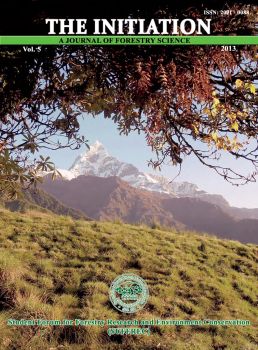Nepal’s Pro-poor Leasehold Forestry Program: Processes, Policies, Problems and Ways Forward
DOI:
https://doi.org/10.3126/init.v5i0.10258Keywords:
Pro-poor leasehold forestry, Tenure right, Supply driven, Learning oriented approach, Natural Resource ManagementAbstract
The pro-poor leasehold forestry program has put forth the ultra-poor’s livelihood agenda in the natural resource management regime and tried to liberate the poor from complex poverty trap through manipulating and institutionalizing the local resources. This paper is based on review of published and unpublished documents, direct field observation of leasehold forest user groups and discussion with concerned stakeholders and line agencies working in pro-poor leasehold forestry program. The paper has explicitly tried to dig out the institutional, field level and legal issues, and put forwarded some ways out. The unclear land tenure right and use rights of conserved forest trees have created misunderstanding to the beneficiaries that ultimately pushed the pro-poor leasehold forestry program towards uncertainty. Both technocratic approach and supply-driven implementation of the program have created misunderstanding while deliberating the program, and resulted low participation, weak institution and little internalization at community level. The explicit learning-oriented approach both in policy making and program designing is central to achieve the dual objectives of program: environmental amelioration and poverty reduction.
DOI: http://dx.doi.org/10.3126/init.v5i0.10258
The Initiation 2013 Vol.5; 84-95

